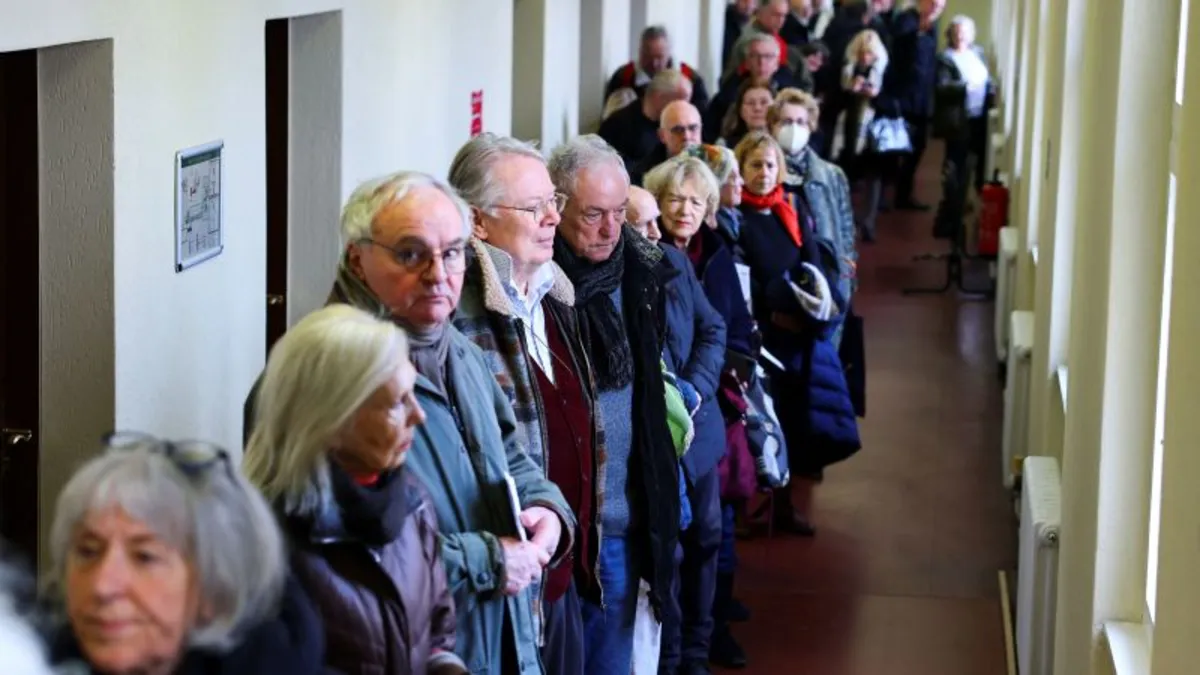
Germans are going to the polls this Sunday for national elections, marking a significant shift in the political landscape. Opinion polls suggest that the outcome will result in a new chancellor and a fresh governing coalition.
Typically known for being a little dry and often predictable, this year's election campaign has been notably eventful. Last November, Chancellor Olaf Scholz of the Social Democratic Party (SPD) made headlines when he unceremoniously fired his finance minister. This move led to Scholz losing a vote of confidence, which triggered early parliamentary elections.
Adding to the drama, Elon Musk, the world's richest man and a known confidant of the Trump administration, entered the campaign fray. He expressed support for the far-right Alternative for Germany (AfD), sparking nationwide debates about Germany's 20th-century history. Chancellor Scholz condemned Musk's backing of far-right politicians in Europe as "disgusting."
Opinion polls indicate that the AfD may break new ground by becoming the second-largest political group in Germany — a first for a far-right party since the Nazi era. Two main themes have dominated the campaign: curbing mass migration and reviving the country's flailing economy.
Friedrich Merz of the Christian Democratic Union (CDU), the party of former Chancellor Angela Merkel, has emerged as the longtime frontrunner in this contest. Polling regularly above 30%, the Union party, composed of the CDU and its Bavarian sister party, the CSU, appears poised to be Germany's largest party, potentially returning to the helm of German politics.
The CDU has adopted a more aggressive stance towards immigration, a significant shift from the Merkel era of open borders. In the final weeks of campaigning, Merz has thrust immigration into the spotlight, even facing accusations of leaving the door open to working with the far-right.
In late January, Merz caused a nationwide stir by attempting to push legislation for stricter immigration controls through the Bundestag, Germany's parliament. Although he ultimately failed to pass a binding bill, his willingness to use AfD's support broke a long-held taboo in German politics and prompted massive protests across German cities.
In an early February interview at his party congress, Merz reiterated to CNN that working with the AfD was not an option. "They are against everything we stand for," he stated. Merz is no newcomer to German politics, having served as a member of the European Parliament and the Bundestag before leaving politics for a corporate law career. He now represents his hometown of Brilon and is reputed to be a millionaire with a private pilot's license.
The AfD's candidate for chancellor, Alice Weidel, is a staunch advocate for anti-immigration policies. The AfD had a successful 2024, performing strongly in regional elections and becoming the largest party in Thuringia, a first since the Nazi era. Opinion polls suggest this popularity has translated to the national level, with the party polling in second place.
At a significant AfD rally, where Musk appeared via video link, Weidel stated that her first act as chancellor would be "closing our borders," a policy she refers to as "remigration," a term with Nazi connotations.
The incumbent chancellor's party, the SPD, faces potential losses in the election. Having been the largest party in the 2021 election, opinion polls suggest a downward swing by around 10 points, placing them behind the AfD and contending with the Greens for third place.
Scholz's "traffic light" coalition has been plagued by infighting, leading to public dissatisfaction. His popularity plummeted to the point where rumors surfaced that his party considered replacing him with Boris Pistorius, the current defense minister, as the Kanzlerkandidat.
The Green Party, polling at around 13%, may not gather enough votes to become the biggest party but could play a crucial role in forming the next government. The Greens' candidate for chancellor is Robert Habeck, currently the nation's economics minister.
Immigration has been the dominant issue in this election. Concerns have been fueled by high-profile attacks allegedly carried out by asylum seekers or migrants. Scholz reintroduced border checks with neighboring European nations, seen as an attempt to win over voters leaning towards the populist AfD.
The economy, usually a powerhouse, is another major focus. Germany's economy has been stagnating, and significant reform is deemed necessary. In January, the Federal Statistics Office reported a 0.2% GDP contraction for the second consecutive year. Russia's war in Ukraine, coupled with rising competition from China in the automotive sector and a looming trade crisis with a belligerent Trump administration, are contributing to economic challenges.
German governments are typically formed in coalitions, as no single party usually garners the 50%-plus votes needed to govern alone. The election winner will seek a partner to form a majority, which can take weeks or even months to finalize. Irrespective of the election outcome, the AfD is expected to be excluded from any coalition.
Germany's coalition governments often receive nicknames based on participating parties. The previous government, led by the SPD (red), included the Green Party (green) and the Liberal Party (yellow), earning the moniker "traffic light" coalition. As the polls close on Sunday night, it remains clear that the next German government will not emerge fully formed immediately.